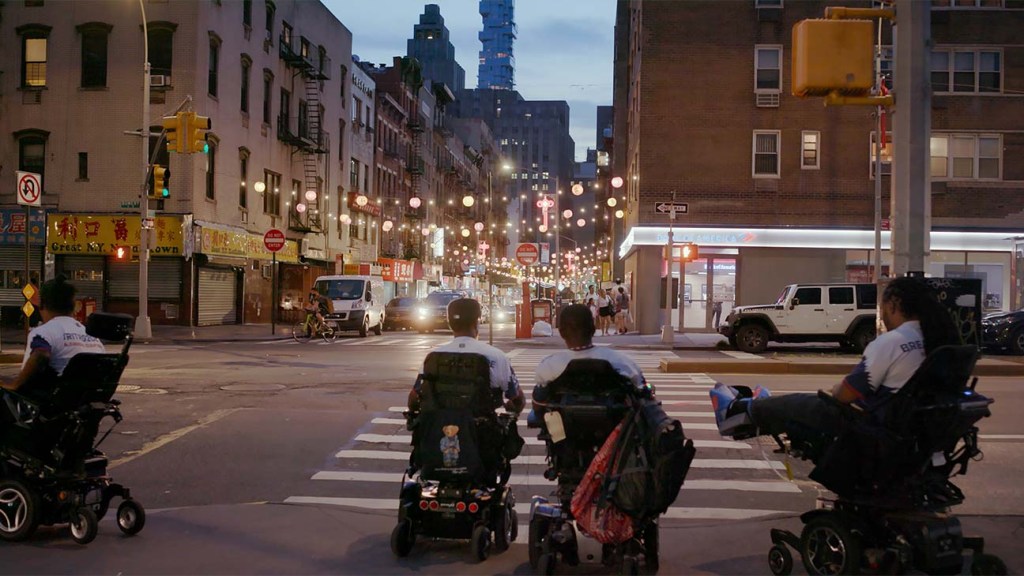
“Quad God”
Tribeca Film Festival
A substantially conventional documentary, Jess Jacklin’s Quad Gods would probably work better as a 90-minute pilot for an ongoing documentary series than as a standalone film, but it does do one unconventional thing very well.
Quad Gods, which will premiere on HBO after its TriBeCa premiere, blends two genres that each tend to favor a single narrative path: Sports movies veer toward unity and victory—lonely athletes discovering they need coaching, love, or mismatched teammates banding together—while disability stories veer toward an accepted version of recovery, a largely ableist version of “normalcy.”
Quad God
Conclusion The “Murderball” of eSports.
Venue: TriBeCa Film Festival (Documentary Competition)
Distributor: HBO
Director: Jess Jacklin
1 hr 27 min
Quad Gods is both a disability story and a sports story, but it pushes back against the traditional storylines of each genre: it’s a sports movie without a championship game, and it’s a movie about disability that rejects a standardized journey of recovery. This counter-storyline makes Quad Gods feel a little underwhelming in the moment, but much more powerful upon closer reflection.
The documentary’s protagonists are members of the Quad Gods, a New York-based team competing in the world of adaptive esports that aims to bring accessibility to the already highly competitive world of connected electronic gaming, specifically, being the first all-quadriplegic esports team.
The primary subjects are Richard, Prentiss, and Blake, but the other Quad Gods players are included, but not in the same depth: Over the course of the documentary, we learn the circumstances behind their disabilities (a shooting, a bike accident, a football injury), but that’s not the film’s real focus.
What’s more interesting is how they live their lives now. This includes their limitations (not due to actual disabilities, but to the myriad accessibility deficiencies that plague New York City (and perhaps every urban space)), their life strategies, and their hopes for the future. These elements intersect at the Capabilities Research Center at the Icahn School of Medicine at Mount Sinai, run by Dr. David Putrino. Here, everyday activities blend with innovations that look very futuristic (virtual reality machines, complex exoskeletons). In simple but fascinating terms, Dr. Putrino explains the role that video games play in neurorehabilitation:
Once he brings the guys together and ideas for a gaming team are floated (“The Wheel Deal” and “Spinal Tap” are rejected team names), you’d think you’d know where Quad Gods is going. But no. This is not a “face adversity and learn how to overcome it” movie, and it’s hardly a documentary about adaptive esports, despite its centrality to the documentary’s basic premise. The truth, as we soon discover, is that these guys (Nyree, the only female on the team, is one of several supporting characters) are not monolithic, nor do they have a singular goal.
As viewers, we’re trained to expect familiar storylines, so their absence jars on a subconscious level; it’s easy to imagine viewers asking, “Why don’t they play more games?” At the same time, it’s more complex and provocative to tear apart people who, to an outsider, are presumably united by their disabilities, allowing them to come alive as individuals, even if the feeling that 87 minutes isn’t enough time to watch the project in its entirety never leaves your mind.
Richard, with his fierce competitive drive and moving relationship with his daughter, is portrayed as the most multifaceted of the participants. Prentiss and Blake are portrayed as contrasting characters: two former football players, one focused on the future and possibly walking again, the other finding peace and joy in the present.
Jaclyn and cinematographers Alex Takacz and David Waldron entrusted the men with a highly polished documentary visual style. Watching Quad Gods with the physical limitations of quadriplegics in mind, what you see is in fact a documentary defined by movement. Blake, running around the city delivering food, becomes the vehicle through which the filmmakers compile a kinetic language. Sometimes we are given a first-person perspective from Blake’s wheelchair, other times we ride with the Quad Gods, and there are frequent humorous compositions in which the camera seems to struggle to keep up with its subjects.
Tim Fox’s animation is a solid version of what’s become a documentary trope in recent years: the blurring of real and virtual worlds, using a video game aesthetic. Having seen it many times, I’ve come to feel that this technique works best when there’s no other footage available, or when the available footage can feel claustrophobic. But what’s so great and inspiring about the Quad Gods is the constant activity and energy in their lives, so any extra embellishment feels unnecessary. It’s hard to look at the Quad Gods and not feel like they’re awesome warriors. I know it’s fun to visualize them as muscle-bound combat warriors and stuff, but they’re already there.
I still think Quad Gods is/could/should be a TV series pilot – I mean, I’d like to see more characterization, more depth, more esports elements – and that’s worthy of praise in itself.

